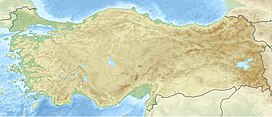Mount Argaeus
| Mount Erciyes | |
|---|---|

Distant view of Mount Erciyes, as seen from Göreme to the west.
|
|
| Highest point | |
| Elevation | 3,917 m (12,851 ft) |
| Prominence | 2,419 m (7,936 ft) |
| Listing | Ultra |
| Coordinates | 38°31′52″N 35°26′49″E / 38.531°N 35.447°ECoordinates: 38°31′52″N 35°26′49″E / 38.531°N 35.447°E |
| Geography | |
| Location | Kayseri Province, Turkey |
| Geology | |
| Mountain type | Stratovolcano |
| Last eruption | 6880 BCE ± 40 years |
Mount Erciyes (Turkish: Erciyes Dağı), also known as Argaeus, is a volcano in Turkey. It is a large stratovolcano that is surrounded by many monogenetic vents, lava domes and one maar. The bulk of the volcano is formed by lava flows of andesitic and dacitic composition. Part of the summit collapsed towards the east in the past.
The volcano began to form in the Miocene. At that time, at first a volcano farther east named Koç Dağ formed from lava flows. Then large explosive eruptions formed a caldera to the east of it. During the Pleistocene, Erciyes proper grew inside the caldera together with a group of lava domes. Lateral eruptions of Erciyes may have generated ash layers in the Black Sea and the Mediterranean during the early Holocene.
The last eruptions occurred during the early Holocene and may have deposited ash as far as Israel; the occurrence of historical volcanism is uncertain. Future eruptions of Erciyes may endanger cities in the north.
The volcano was glaciated during the Pleistocene and one regular glacier exists still today, but is receding.
Erciyes was historically known as Argaeus, a name derived from the king of Macedon Argaeus I (678 - 640 BC). Until the 1950-1960, the name of the volcano was "Erciyas". An alternative theory posits that the name of the mountain in Hittite meant "white mountain" and that the current name also means "white mountain".
...
Wikipedia

